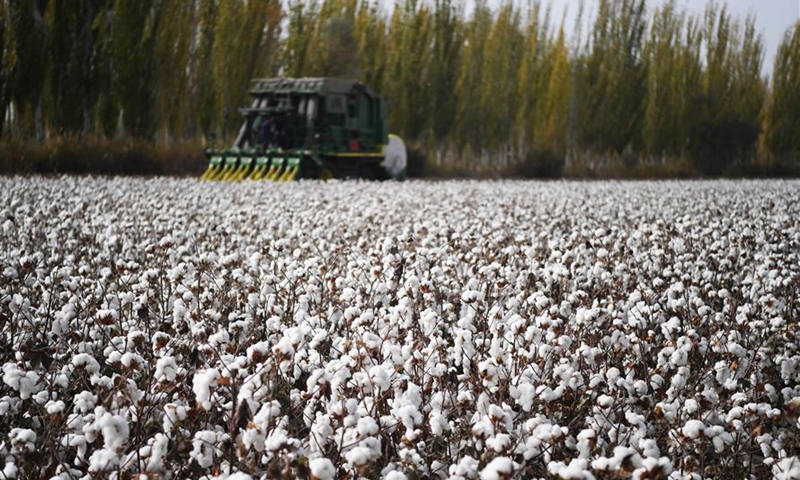US fallacy on Xinjiang cotton a humiliation to humanitarianism: Global Times editorial

Photo taken on Oct. 25, 2019 shows a cotton harvesting machine working in a field in Awat County, northwest China's Xinjiang Uygur Autonomous Region. With a long history of cotton planting, Awat is known as the "Town of Cotton" in China. The county boasts high-quality cotton and high-efficiency in production. Photo:Xinhua
On Friday, the spokespersons of the White House and US Department of Stateraised their voices on Xinjiang cotton. State Department spokeswoman accused the Chinese government of leading a "state-led" social media campaign against foreign companies "for their decision to avoid inputs using Xinjiang cotton because of forced labor." White House press secretary called on the international community to "oppose China's weaponizing of private companies' dependence on its market to stifle free expression and inhibit ethical business practices."
The is a move of US government to further manipulate and incite conflict between multinational corporations and the Chinese market. As is known to all, the US groundlessly charged Xinjiang cotton for being produced by forced labor in September 2020, and later violated basic business norms by banning all cotton products from Xinjiang, and also forced multinational companies to declare that they do not source products from the region.
Amid the escalation of the confrontation between China and the West over Xinjiang affairs, the Chinese public launched a wave of condemnation on those transnational corporations. Washington is to blame to the severe conflict.
When the US accused Xinjiang of using forced labor to produce cotton, it has never provided any relevant evidence. Xinjiang local authorities have been coordinating jobs for local residents outside the region as an attempt to alleviate poverty, which is a common practice in China. Yet the effort has been labeled as "forced labor." According to the US logic, the campaign to promote the moderately prosperous society in all respects in China, which has lifted countless Chinese people out of poverty, must have been achieved through "forced labor." Such a fallacy is a humiliation to humanitarianism.
China's social media campaign against foreign companies, those who have boycotted Xinjiang cotton, started spontaneously. The accounts of some media outlets have participated in it simply because they have always been a part of Chinese internet public opinion. The Chinese authorities have never coerced any foreign companies to do anything. The fierce sentiment from the market is undoubtedly the real pressure those foreign enterprises have to face.
It is worth mentioning that despite the heated online condemnation, there have been not a single on-site incidents of sabotage targeting related foreign stores throughout China. On the contrary, we have witnessed quite a few beating, smashing and looting during the "Black Lives Matter" movement in the US. It is quite obvious what the nature of Chinese public's protest is.
The US government is the brute force which has intruded into the commercial realm. The boycott against Chinese companies was initiated and forcibly demanded by the US government. The attacks on Xinjiang cotton were also imposed on companies from various countries by the US government, taking advantage of US market power. Washington has maliciously fabricated charges, tampered with business ethics and used the domestic market as a leverage to carry out its coercion. Yet the US is now accusing the Chinese government of "coercion." This is a shameless modern version of calling white black with heinous intention.
Xinjiang cotton accounts for 20 percent of the world's annual production. US' anti-China policy is creating extremely serious market antagonism, leading to fragmentation of the international market. We call on companies from all countries not to succumb to the pressure of the US government. Their administrative order to boycott Xinjiang cotton has undermined basic business norms in the era of globalization and harmed the interests of enterprises and consumers. People should not obey the US, but should fight together against it. Today's world should not be manipulated by the private interests of the US, it should be an equal world for everybody.
